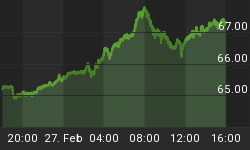Remember that catchy love song that Frank Sinatra made popular in the 1960s, "The Best Is Yet To Come"?
"The best is yet to come and, babe, won't that be fine?
You think you've seen the sun, but you ain't seen it shine."
At the risk of mixing musical metaphors and styles, it looks more like the sun has deserted us right now in the financial markets, and we're about to see "The Dark Side of the Moon," the title of Pink Floyd's 1973 smash album. With the subprime mortgage problems reaching farther and farther out to touch hedge funds, U.S. and European banks, mortgage companies and money-market funds, what we're going to experience sounds more like "The Worst is Yet To Come."
That's because the financial markets must contend not only with the credit crunch brought on by rising foreclosures now; they must also deal with the repercussions from more foreclosures over the next 18 months as more adjustable-rate mortgages (whether subprime or not) reset from low teaser rates to higher interest-rate levels.
How bad can it get? Investment adviser John Mauldin recently published a month-by-month account of the dollar amount of mortgages that will be reset through 2008, and the largest reset amounts pop up in the first six months of next year. In fact, as he points out, the $197 billion of mortgage resets so far this year is "less than we will see in two months (February and March) of next year. The first six months of next year will see more than the total for 2007, or $521 billion."
So, we haven't even begun to feel the pain yet. It's bad enough for the folks who will find that they can't keep up with the higher mortgage payments and will have to move out of their homes. But the financial markets won't be catching a break either. The antiseptic phrase used to describe the situation is "repricing risk." That means that investors have woken up to the fact that the AAA-rated mortgage-backed securities and derivatives they invested in look more like junk bonds now. This eye-opener causes them to want higher yields from what they now see as riskier vehicles.
That new investor caution plays out this way: investment banks, hedge funds and any other entity that bought securities backed by subprime loans now find it hard to sell the darn things. It's almost the same as homeowners trying to find buyers for their homes ? nearly impossible in a market where home prices are falling. In the financial markets, it's nearly impossible because no one even wants to attach a price to a collateralized debt obligation today for fear that it will be priced much lower tomorrow.
The Fed can try to calm such fears all it wants by lowering the discount rate and giving banks more time to pay back loans (from overnight to 30 days), but the real problem can't be fixed with more access to credit. The fact is nobody wants any more of that. What they really want is cash to pay off their debts, be it a mortgage or an unwinding of a securities bet.
Wall Street's denizens are in the dark about how much their schemes depend on the ocean of liquidity created by the bull market, say Elliott Wave International's analysts, Steve Hochberg and Pete Kendall. They are particularly struck by the image of the Grim Reaper that Business Week magazine put on its cover recently with the headline, "Death Bonds:"
"The grim reaper is the perfect visage to welcome the arriving wave of liquidation; it will wreak havoc with their work. The field's dark fate is clear in one fund manager's description of what caused 'forced sales' at another fund: 'The models work when they look at history, but not when history is all new.' What's 'new' is that for the first time in the experience of many model makers, confidence is on the run. As they rob Peter to pay Paul, all assets will be impacted in negative ways that do not compute in their models." (The Elliott Wave Financial Forecast, August 2007)
And the bad news just keeps accumulating:
- Housing prices dropped 3.2% percent in the second quarter compared with last year, the largest drop since Standard & Poor's started tracking home prices in 1987.
- CIT Group closed its mortgage unit this week, while Lehman Brothers closed its own last week. Mortgage companies that specialize in low-quality mortgages are either going out of business (London-based HSBC) or struggling (California-based Countrywide).
- The Wall Street Journal lists the number of fired employees at seven mortgage companies, including First Magnus (6,000), Capitol One's Greenpoint (1,900), Associated Home Lenders (1,600) and Lehman (1,200), which totals more than 12,000 suddenly unemployed mortgage writers.
To top it off, Bloomberg reports that the subprime mess may lead to lower bonuses for the first time in five years on Wall Street, according to Options Group, a company that's been tracking this kind of information for a decade.
Somewhere, the world's smallest violin is playing a sad song for the fund managers and investment bankers who won't be taking home that million-dollar-plus bonus this year. And Frank Sinatra is singing a sad refrain? "The worst is yet to come."
For more information on the housing market and the credit crisis, access the free report, "The Real State of Real Estate," from Elliott Wave International.















